Early teenage years.
Life as a
teenager (I think the word was first used from the early '40s but was in common
use in the 50s.) continued around the
social activities of the church.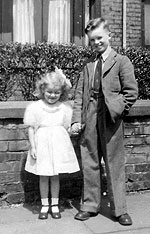
I was 13 in 1951. The Korean War was 150-1953, the nucleur bomb testing was happening right up to my late teens, when I became involved on Christmas Island, the Festival Of Britain (which I didn't see) took place in London.
I was 14 when the King, George the sixth died & Princess Elizabeth became Queen. The United States B-52 Stratofortress flies for the first time & in 2010 is still there, along with the Agatha Christie's murder-mystery play The Mousetrap opened at the Ambassadors Theatre in London in 1952 and remains the longest continuously running production of a play in history!
 I left school at 15 in 1953 the year
Joseph Stalin died, Ian Fleming publishes his first James Bond novel, Casino
Royale, Sir Edmund Hillary and Tenzing Norgay become the first men to reach the
summit of Mount Everest but much more important in my life, the film "Shane" was
released, a huge influence & long standing joke in the entire family! An
iconic western, natural & based on a truth about the "Wild West". It was to
change the way boys, like me, grew to understand the realities of a part of
history we never stopped being interested in.
I left school at 15 in 1953 the year
Joseph Stalin died, Ian Fleming publishes his first James Bond novel, Casino
Royale, Sir Edmund Hillary and Tenzing Norgay become the first men to reach the
summit of Mount Everest but much more important in my life, the film "Shane" was
released, a huge influence & long standing joke in the entire family! An
iconic western, natural & based on a truth about the "Wild West". It was to
change the way boys, like me, grew to understand the realities of a part of
history we never stopped being interested in.
At 16 in '54, Roger Bannister ran the first four-minute mile, Food rationing in Great Britain ended with the lifting of restrictions on sale and purchase of meat, 14 years after it began early in World War II and nearly a decade after the war's end. in 1955 Evan Hunter's movie adaptation of the novel "Blackboard Jungle" premieres in the United States, featuring the famous single, Rock Around the Clock, by Bill Haley and His Comets. Teenagers jump from their seats to dance to the song & Rock & Roll is born. That iconic teenager's idol, actor James Dean was killed when his Porsche sports car collides with another car at a highway junction near Cholame, California. Dean is just 24 years old. I joined the Air Force at nearly 18 in 1956.
It was all the familiar things of youth, like waiting outside the Girl Guide meeting to walk Elizabeth Roberts home. Reading the latest top ten in the tiny record shop by the pub on Gt. Western St. We found out later, that it wasn’t the actual sales of records that calculated the charts, but sales of sheet music. We discovered the fact that one of my mates could tell you, which kind of bus was coming down the street in a Manchester fog. “It’s a Crossley!” he say & by gum, he’d be right too. The rattley, noisy old trams had finished in 1949 and like most boys of that era, any form of transport was interesting. Billy Mottram’s dad drove a lorry carrying steel. My uncle Bob, uncle Jim & granddad all drove buses but only the middle class had cars as a normal mode of transport. To own a car was a thing to aspire too. I don’t think that anyone had a car and lived in the streets around us. I remember when Arthur Burden the organist from the church, got a 100E Ford popular "Sit up & beg", it was just under £400 brand new. Although all forms of transport were common in the Manchester area, I can remember all the kids running out & waving if a car came through the square, from Church Lane or The Sands, whilst I was holidaying in Whalley.
I spent
many hours up in my attic bedroom. Painting, taking weather details for my Scout
badge or making balsa aircraft, both to fly &
display. The modelling came from Ken my uncle. There was nowhere to fly aircraft in
Manchester. Try Alex Park & you were bound to fly it into some poor visitor
or get chased off by a park keeper (a "Parky").
After saying that, I’m sure I built them for just for pleasure, to see a box of wood,
tissue & bits, end up as a great replica of a Hawker Hurricanes, Black Widow
bomber or sail planes like the Soarer Major, was very rewarding and I loved
anything that flew. 
 Little
did I know, when I lived there, that there was an Alexandra Park as Manchester's
second aerodrome. Alexandra Park Aerodrome was the site was chosen by the War Department in
1917 because of its open agricultural nature, and lay between the neighbouring
districts of Fallowfield, Chorlton and West Didsbury, at the junction of
Princess Road and Mauldeth Road, three miles south of the City Centre. Following
the closure of the airfield at Trafford Park, Alexandra Park Aerodrome was
constructed and opened in May 1918 by the War Department for the assembly, test
flying and delivery of aircraft for the RAF built locally by A.V.Roe & Company
(Avro) at Newton Heath and the National Aircraft Factory No.2 at Heaton Chapel.
The airfield took its name from the nearby Alexandra Park station on the Great
Central Railway branch to Manchester (Central) railway station. The Avro
Transport Company operated the UK's first sustained domestic air service to
Birkdale Sands (Southport) and South Shore (Blackpool) from Alexandra Park
Aerodrome between 24 May and 30 September 1919, mainly using
Little
did I know, when I lived there, that there was an Alexandra Park as Manchester's
second aerodrome. Alexandra Park Aerodrome was the site was chosen by the War Department in
1917 because of its open agricultural nature, and lay between the neighbouring
districts of Fallowfield, Chorlton and West Didsbury, at the junction of
Princess Road and Mauldeth Road, three miles south of the City Centre. Following
the closure of the airfield at Trafford Park, Alexandra Park Aerodrome was
constructed and opened in May 1918 by the War Department for the assembly, test
flying and delivery of aircraft for the RAF built locally by A.V.Roe & Company
(Avro) at Newton Heath and the National Aircraft Factory No.2 at Heaton Chapel.
The airfield took its name from the nearby Alexandra Park station on the Great
Central Railway branch to Manchester (Central) railway station. The Avro
Transport Company operated the UK's first sustained domestic air service to
Birkdale Sands (Southport) and South Shore (Blackpool) from Alexandra Park
Aerodrome between 24 May and 30 September 1919, mainly using
 Avro 504 biplanes.
From 1922 until 1924, there were daily scheduled flights to Croydon Airport
London, later followed by a regular extension to Amsterdam. The Lancashire Aero
Club (the oldest flying club in Britain) was founded here in 1924. However,
hangars were demolished and the aerodrome was closed on 24 August 1924,
following the refusal by Lord Edgerton of Tatton for the land to continue in use
for aviation. Princess Road was built through the eastern part of the airfield
and a housing estate erected on the eastern edge of the airfield site.
The remaining area of open land to the west of Princess Road is now Hough End
Playing Fields, a council-owned facility with 24 full-size pitches and 3 rugby
pitches. It was on Mauldeth Rd. West, over looking the fields, that Auntie
Ann & Uncle Harold lived before they both died.
The original Victorian Alexander Park, whose gates were at the top on Greame St.,
was on Alexandra Rd. That was the place I remembered going to all my childhood.
It was designed by Alex Hennell and was opened on
6 August 1870. The land was purchased from Lord Edgerton, by the then Corporation,
for £24,000 in 1864.
Avro 504 biplanes.
From 1922 until 1924, there were daily scheduled flights to Croydon Airport
London, later followed by a regular extension to Amsterdam. The Lancashire Aero
Club (the oldest flying club in Britain) was founded here in 1924. However,
hangars were demolished and the aerodrome was closed on 24 August 1924,
following the refusal by Lord Edgerton of Tatton for the land to continue in use
for aviation. Princess Road was built through the eastern part of the airfield
and a housing estate erected on the eastern edge of the airfield site.
The remaining area of open land to the west of Princess Road is now Hough End
Playing Fields, a council-owned facility with 24 full-size pitches and 3 rugby
pitches. It was on Mauldeth Rd. West, over looking the fields, that Auntie
Ann & Uncle Harold lived before they both died.
The original Victorian Alexander Park, whose gates were at the top on Greame St.,
was on Alexandra Rd. That was the place I remembered going to all my childhood.
It was designed by Alex Hennell and was opened on
6 August 1870. The land was purchased from Lord Edgerton, by the then Corporation,
for £24,000 in 1864.
 It was in Alexandra Park that a fair came. There was a giant chair ride. Just
chairs on long chains & you whizzed round, flinging the seats further & further
out. I always knew that a high step or a merry go round would make me ill, but my mate
Peter Dixon said he ridden bigger one in Morecambe, or some such place. It was the
first time I ever saw anyone change from joy to green very gradually. He threw up
after he got on the ground.
It was in Alexandra Park that a fair came. There was a giant chair ride. Just
chairs on long chains & you whizzed round, flinging the seats further & further
out. I always knew that a high step or a merry go round would make me ill, but my mate
Peter Dixon said he ridden bigger one in Morecambe, or some such place. It was the
first time I ever saw anyone change from joy to green very gradually. He threw up
after he got on the ground.
I enjoyed painting; the two pictures I remember were a view of granddads garden. I did it from memory & he soon spotted I had painted the garden wall level, instead of giving it the curve it had. Never mind, as it was oils, I soon changed that! The other was a view of Plymouth Hoe. I think Elizabeth’s parents came from that area, so I guess I was trying to flatter them with attention!
To get my meteorologist badge at scouts I had to take weather readings three times a day . They didn’t bother that the measurements were 30 feet in the air, instruments out in the open, guessed wind direction & strength, guessed the type of cloud & coverage but the wonderful thing was; I never tried to give any kind of forecast, and no one asked me. What a dumbo! All those measurements and no idea of putting them to any use at all! Mind you the man who tested me, didn’t say anything either!Typically, doing his best for his scouts, Skipper organised a trip to a met office at Manchester airport. When I saw the control tower, I thought, I’d like to work up there. Little did I guess years later, that’s exactly what I'd do.
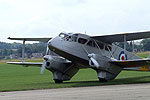 Skipper
also took me for my first flight from Blackpool airport too. He paid five shillings
each, (twelve and a half new pence) for a twenty minute flight in a De Havilland
Dragon Rapide. A beautiful aircraft, designed full of elegance by Sir Geoffrey
Raoul de Havilland. At the Imperial War Museum in Duxford in Cambridgeshire,
Rapides still give pleasure flights. Air Atlantique had one flying around North
Wales out of Camarthan airport. Fantastic memory. Slightly queasy in cane seats,
but what a view! It certainly cemented a love of flying.
Skipper
also took me for my first flight from Blackpool airport too. He paid five shillings
each, (twelve and a half new pence) for a twenty minute flight in a De Havilland
Dragon Rapide. A beautiful aircraft, designed full of elegance by Sir Geoffrey
Raoul de Havilland. At the Imperial War Museum in Duxford in Cambridgeshire,
Rapides still give pleasure flights. Air Atlantique had one flying around North
Wales out of Camarthan airport. Fantastic memory. Slightly queasy in cane seats,
but what a view! It certainly cemented a love of flying.
In the autumn & winter we use to do a lot of rehearsing of gang shows, plays and variety shows with the youth club & scouts. I remember doing a brilliant skit of a black & white movie. I played the young girl, Mr. Lawley was my mother and I think one of the Foden boys was the evil villain. A set of white lights flashed in the footlights, to simulate a flickering movie & it was an outrageously overacted drama. It was a hit. It never occurred to me, until years later, that the very sight of Mr. Lawley, a pillar of the community, acting in drag, was probably the high light! Someone wrote a little ditty that got us from one scene to the next, with noise & pandemonium happening behind the curtain, three of us sang a couple of verses in front of the curtains, that started “We are three little fellas, what are doing our best, to fill up a gap in the program”
They were teaching dancing at the youth club. Did I have no aptitude, not interested or just two left feet? It would have helped get girlfriends but I didn’t try hard enough! (Where have I heard that before?) Of course I could dance the Valeta and the old time dances (that no sensible girl would be seen dead doing that!).
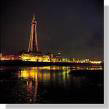 It
was probably through the Sunday school or youth club, that we did the classic
1950s trip, going to see the Blackpool Lights. It was a magic time early on, a thrilling, fascinating
experience that was so different to the grey of Manchester. If you look now, all
the best photographs of the lights are modern ones, taken in colour & the rain.
The lights reflected everywhere, there appeared to be movement in the displays,
all the trams were lit up. It was a feast for
the eyes.
There was always an offer of 6d, for the first one to see Blackpool tower! Later on,
it was a great reason to go with a girl you fancied. Because of the traffic
jams and coming back so incredibly late, you thought it was a sin you’d got away
with!
It
was probably through the Sunday school or youth club, that we did the classic
1950s trip, going to see the Blackpool Lights. It was a magic time early on, a thrilling, fascinating
experience that was so different to the grey of Manchester. If you look now, all
the best photographs of the lights are modern ones, taken in colour & the rain.
The lights reflected everywhere, there appeared to be movement in the displays,
all the trams were lit up. It was a feast for
the eyes.
There was always an offer of 6d, for the first one to see Blackpool tower! Later on,
it was a great reason to go with a girl you fancied. Because of the traffic
jams and coming back so incredibly late, you thought it was a sin you’d got away
with!I can
still see the people we visited once at an old peoples rest home. Many were very ill
with stuff I had never faced before. Acute arthritis, emphysema or cancer and many of them were
never going to leave this home. I felt guilty that we didn’t go regularly &
commit our youth to help them. Maybe the youth leaders thought it was too much
for us. Maybe some kids were, genuinely, too upset to cope. I still remember the old
guy who smoked a pipe. It had a lid on top that was hinged & looked like the
top of a
pepper pot. He said it was so his ash wouldn’t blow into any ones face. His
nurse told me this guy never got outside the home now.
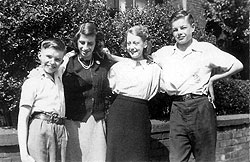 In 1951,
the Festival of Britain was taking place on London’s
South bank.
(7)
We were on rations & had no money, so I guess Dad thought it was a
waste of money. I certainly didn’t get to go. Don’t think it was the principle, I just think we
couldn’t afford it. Looking back, I think it illustrates how I daydreamed
through life. I wasn’t included in any family discussions about whether I should
go, I was a child, adults didn’t discuss things, and they handed down decisions.
I knew about the festival but it could have been held in Mongolia for all I
knew. I have no recollection of anyone else in the area going but if they did, I
either wasn’t interested enough or never got into a conversation with any one
who could afford it. I can’t recall any school, Scout or Church doing a trip.
This was the most publicised post war event ever; I think the real world must have
passed two feet over my head.
In 1951,
the Festival of Britain was taking place on London’s
South bank.
(7)
We were on rations & had no money, so I guess Dad thought it was a
waste of money. I certainly didn’t get to go. Don’t think it was the principle, I just think we
couldn’t afford it. Looking back, I think it illustrates how I daydreamed
through life. I wasn’t included in any family discussions about whether I should
go, I was a child, adults didn’t discuss things, and they handed down decisions.
I knew about the festival but it could have been held in Mongolia for all I
knew. I have no recollection of anyone else in the area going but if they did, I
either wasn’t interested enough or never got into a conversation with any one
who could afford it. I can’t recall any school, Scout or Church doing a trip.
This was the most publicised post war event ever; I think the real world must have
passed two feet over my head.
On the other hand, I learnt that in this real world, small guys had to work harder at getting girls than tall good-looking ones, that was personal! A sense of fun & humour was attractive, but was the other guys that got the snogs!
 The
Korean War was between June 1950 & July 1953. Apart from my love of aircraft
that flew out there & remembering that Bill Speakman from Cheshire
(8)
got his Victoria Cross, I don’t
remember any one I knew discussing this other war. It was in the papers for
sure. I do know that, in the R.A.F. and not school that I learnt more about life as it was, from
older war veterans, who came out with classics that put my boyhood dreams of
heroism, into reality. One of them said
"There's only three ways to win a V.C. medal, Lowe! Your
completely desperate, your pissed out of your brain or you haven’t the sense you
were born with! You haven’t lived until you’ve shit yourself doing a
bombing run over the
Ruhr.”
The
Korean War was between June 1950 & July 1953. Apart from my love of aircraft
that flew out there & remembering that Bill Speakman from Cheshire
(8)
got his Victoria Cross, I don’t
remember any one I knew discussing this other war. It was in the papers for
sure. I do know that, in the R.A.F. and not school that I learnt more about life as it was, from
older war veterans, who came out with classics that put my boyhood dreams of
heroism, into reality. One of them said
"There's only three ways to win a V.C. medal, Lowe! Your
completely desperate, your pissed out of your brain or you haven’t the sense you
were born with! You haven’t lived until you’ve shit yourself doing a
bombing run over the
Ruhr.”
I seemed to spend my teens trying to avoid playing endless games of Ludo as the
family
needed me to make up a four, going to Alexandra park to watch Dad & Jimmy
Jackson
play bowls, hearing darts thudding into the board hung on the kitchen door and not being allowed to make a sound as the football results came on
the radio.
I don’t know what year I got my first Meccano set but it sure got used. Hours and hours were spent with that toy. I’m fairly sure I got an additional set each Christmas, taking me to the next level; I think I got up to an eight or nine, ten being the top dog. I do seem to remember indoor activities more than outdoor. I think I was called in early. Don’t think Mum thought I should be “roaming the streets”, she much preferred to know where I was & what I was doing. She needn't have worried, being a devout coward, I would always walk away from a problem. I seemed to have a huge guilt complex if I was tempted to do anything wrong. I wonder how much came from mum & how much came from the church.
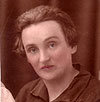 Whalley was my balance.
Although I noticed that Gran was getting tetchy later on, I put this down to a
women's old age, on
the advice of Ken. Little did we know that she was starting to die of cancer? As
these were the days of knowing nothing about women, I was bowing to his superior
knowledge. Little did I know, he knew bugger all too! The restrictions of
parents weren’t
at Whalley and I think Grandma was more relaxed about real life. It was safe,
normal & everyone knew everyone else. I went to the cinema with my
friends so many times in
Whalley. The show changed three times a week! I must have seen hundreds of
films, grandma paying for every one. In Manchester, apart from the Saturday morning cinema for kids and an
occasional visit with Mum, I can say I hardly went. I think the cinema was
slightly frowned on by the church, my evenings were either at home or the church
and I don’t think pocket money ever stretched that far. I am quite sure the
cinema influenced me, as kids are affected by TV now. The choice was normally
the Odeon, the Imperial or the Globe in our area.
Whalley was my balance.
Although I noticed that Gran was getting tetchy later on, I put this down to a
women's old age, on
the advice of Ken. Little did we know that she was starting to die of cancer? As
these were the days of knowing nothing about women, I was bowing to his superior
knowledge. Little did I know, he knew bugger all too! The restrictions of
parents weren’t
at Whalley and I think Grandma was more relaxed about real life. It was safe,
normal & everyone knew everyone else. I went to the cinema with my
friends so many times in
Whalley. The show changed three times a week! I must have seen hundreds of
films, grandma paying for every one. In Manchester, apart from the Saturday morning cinema for kids and an
occasional visit with Mum, I can say I hardly went. I think the cinema was
slightly frowned on by the church, my evenings were either at home or the church
and I don’t think pocket money ever stretched that far. I am quite sure the
cinema influenced me, as kids are affected by TV now. The choice was normally
the Odeon, the Imperial or the Globe in our area.
 The Coronation passed me by in 1953. The entire world seemed to want to watch it
on their new televisions. (Not that our family had a TV, I must say.) I was proud that Hillary
& Tensing managed to conquer Everest. In these days of Empire, we didn’t seem to
mind saying “we” conquered the world’s highest mountain, despite one being from
New Zealand & one a Tibetan. At least we had an Englishman called Sir John Hunt
who led
the expedition!
The Coronation passed me by in 1953. The entire world seemed to want to watch it
on their new televisions. (Not that our family had a TV, I must say.) I was proud that Hillary
& Tensing managed to conquer Everest. In these days of Empire, we didn’t seem to
mind saying “we” conquered the world’s highest mountain, despite one being from
New Zealand & one a Tibetan. At least we had an Englishman called Sir John Hunt
who led
the expedition!There was one day, around my thirteenth birthday that a buzz ran round the school. The teachers where all in conference & we had to be told the King had died. Respect for the monarchy was at a level that is incomprehensible today. We weren’t sad, we just wanted to know if we would get a day off school! No! King George VI was far too sensible; he thought education was more important. And so we entered the world of a second Queen Elizabeth. She was the eldest daughter of a man who became King only because his brother abdicated to marry an American divorcee. How the world has changed.
Next, the start of working for a living.

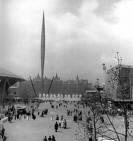 (7)
“The Festival of Britain”
(7)
“The Festival of Britain”